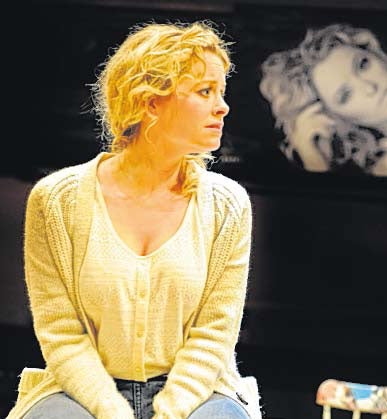Yours for the Asking, Orange Tree Theatre, Richmond

Alluring black-and-white posters of a near-naked blonde advertising perfume dominate all four sides of the action in Sam Walters’ UK premiere of this intriguing Spanish play. Theatrical sponsorship gone mad?
These commercial icons have such an insistently seductive presence that you might momentarily think so. But no, the experience of the model who beams down from the Orange Tree’s balconies is one of the crucial elements in Yours for the Asking, a play which Ana Diosdado wrote in 1973, two years before the fall of Franco, and in which she offers powerful images for the despairing sense of paralysis felt by the opponents of his fascist regime.
The proceedings kick off as Steven Elder’s finely judged Juan, an embittered, world-weary journalist on Woman Talk, prepares to write up a week-long interview he has just conducted with Susi, a national superstar model now fallen from grace. From this vantage point, the play darts backwards and forwards in an intricate, fractured time-scheme, adroitly handled in Walters’ fluent production, that is like the chronicle of a fate foretold (though there are surprises) as it jumbles the progress of their encounter with its horrible aftermath.
On his way to Susi’s flat, Juan gets stuck in the lift, a recurring metaphor of entrapment in the piece. Comically, this doesn’t stop them talking and by the time he is released, the pair have recognised one another as soulmates and they embark on a brief, passionate affair. He was once a political rebel who became disillusioned when his friends failed to support him after a stint in jail. She was the idolised “face” of the perfume until its toxic effects turned her into a pariah.
Mia Austen strikingly captures the mix of vulnerability and newly awakened sharpness in this once-naive girl. Used by the parent laboratory as a decoy to distract attention from its real wrongdoings, Susi epitomises the destruction of the individual by a corrupt system. It’s a subtle and moot point how far the defeatist Juan is exploiting her, in turn, in making her the symbol that seems to vindicate his feelings of futility in his article.
The play, though, feels unduly tortuous and long-winded and, at certain points, implausible. For example, given the cringing self-censorship of the press, would Woman Talk have sent Juan, in the first place, to interview so controversial a figure?
To 6 October (020 8940 3633)
Join our commenting forum
Join thought-provoking conversations, follow other Independent readers and see their replies
Comments
Bookmark popover
Removed from bookmarks